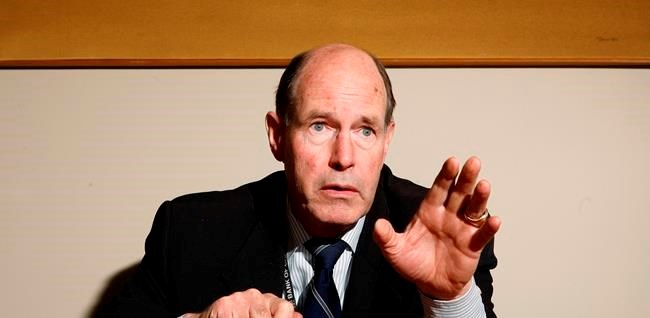LAKE LOUISE, Alta. — Canada must shift its attention to investing for economic growth as the world recovers from the COVID-19 pandemic downturn over the next few years, says former Bank of Canada governor David Dodge.
In an online presentation at the virtual Bennett Jones Lake Louise World Cup Business Forum on Friday, the former central bank chief said Canadian governments and businesses will have the advantage of low interest rates as they continue to need to borrow money in 2021 and 2022.
"Federal and provincial governments will have borrowed enormous amounts, $400 billion to date this year for the feds, $100 billion for the provinces, 20 per cent of Canadian GDP. And they will have to keep on borrowing through 2021 and 2022 in lesser amounts in order to ensure that a recovery is sustained," he said.
"It is essential the government ... supports investment in this period and not just private and public consumption as has been the case to date."
The business forum is normally held in Lake Louise, Alta., in conjunction with World Cup alpine ski races, but both the races and the in-person conference were called off this year because of the pandemic.
Dodge said he's expecting about 3.9 per cent economic growth in Canada in 2021, assuming vaccines are widely available after the second quarter, and 1.9 per cent in 2022.
The pace of growth should return to 2019 levels by the spring of 2022, he said, but national output will still be three per cent lower than it would have been without COVID-19.
Dodge said a key challenge for Canada going forward is to continue to develop its technology expertise to compete with the growing influence of China.
"COVID has accelerated the transformation to a truly digital world and to Asia as it's epicentre," he said.
"Canada can thrive in this world as long as Canadian businesses, workers and governments work together and focus on investing in the future, not in preserving the past."
In a separate presentation, Anthony Viel, CEO of Deloitte Canada, said the country can bounce back better from the pandemic if it renews its focus on building a well-trained workforce reinforced by immigration, improving industry productivity and making better societal systems.
"In our latest report ... we make the case that Canada can't return to the pre-COVID path: divided, haves and have-nots, an aging population, poor productivity growth, low levels of investment leading to stagnating standards of living, stalled progress on national priorities and slowing growth in an increasingly competitive global economy," he said.
He said the pandemic has put a "spotlight" on Canada's chance to change how it functions to build a brighter future for Canadians.
Deloitte recommends that governments, businesses, and communities cooperate in new ways to pay for the rebuild using collaboration as they've done during the pandemic, adding Canada should study other country's models to find out how best to finance needed large projects.
This report by The Canadian Press was first published Nov. 27, 2020.
Dan Healing, The Canadian Press



